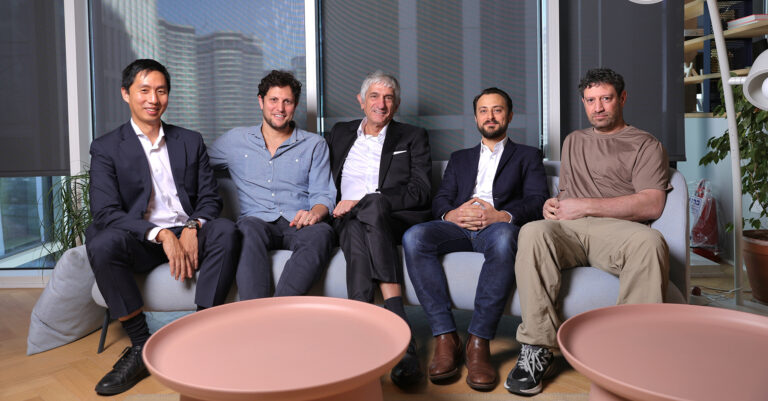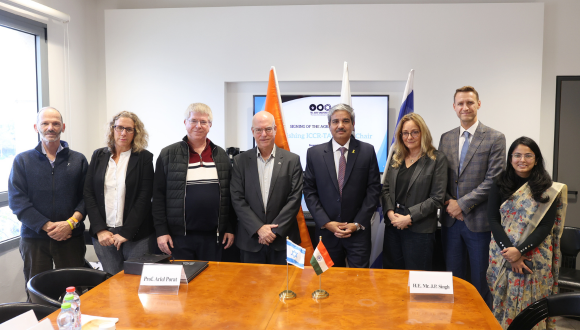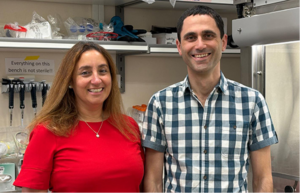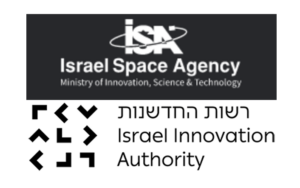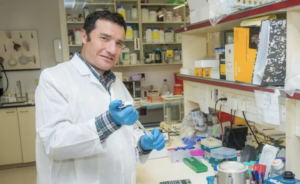Hackathon du JCT 2021 (Jérusalem) : des étudiants français remportent les deux premiers prix. Wi-Find localise les appareils dans les bâtiments

[:fr]
Plus de 100 étudiants israéliens et internationaux du JCT, Collège de technologie orthodoxe et ultra-orthodoxe de Jérusalem, ont participé au Hackathon 2021 du JCT. Ils ont relevé les défis lancés par Intel, Rafael Advanced Defense Systems, Medtronic, SpotReality, Toldot Yisrael et la police israélienne.
NDLR : Contraction de « hack » et « marathon », un hackathon est un événement lors duquel des équipes (développeurs, designers, chefs de projet…) doivent développer un projet informatique, un logiciel ou une application. Elles doivent le faire sur une période limitée, et courte (une journée, une nuit, un week-end). Le but est de coder rapidement quelque chose d’astucieux et d’utile et de le développer de manière intensive, sans s’arrêter journaldunet.
Une équipe de trois étudiants du Jerusalem College of Technology (JCT), composée d’un français, d’un brésilien et d’un israélien, a remporté la première place la semaine dernière lors du 6e Hackathon annuel Great Minds du JCT en développant un logiciel avancé pour mieux localiser les équipements mobiles des entreprises. De nombreuses organisations et entreprises disposent d’équipements importants qui sont déplacés régulièrement au sein de leurs bâtiments en différents endroits sans traçabilité.
Pouvoir localiser les équipements facilement et rapidement est crucial, mais beaucoup se situant en structure fermée, le GPS standard ne peut pas être utilisé car il n’est pas assez précis à l’intérieur des bâtiments. Wi-Find, l’équipe gagnante de Yosef Mizrahi (Brésil), Ariel Szmerla (France) et Amitai Salomon (Israël), a développé une solution facile à utiliser utilisant des composants peu coûteux qui peuvent récupérer les données des signaux qui l’entourent. Ils ont développé un moyen de traiter les informations et de cartographier l’emplacement exact de l’objet. Les applications de cette technologie sont innombrables, en particulier dans les endroits dotés d’équipements mobiles vitaux et/ou coûteux, comme les hôpitaux, les chantiers de construction… Sur la base de cette technologie, on peut également construire à l’avance un modèle pour positionner au mieux l’équipement mobile afin de minimiser le temps perdu par les employés à rechercher un équipement nécessaire. Dans un hôpital, on saurait exactement où se trouve l’équipement de sauvetage mobile à un l’instant T, et un modèle pourrait en outre être construit sur l’endroit où positionner au mieux l’équipement en premier lieu.
En plus du domaine médical, d’autres industries pourraient maximiser le temps des employés grâce à une gestion et à une localisation efficaces des équipements, tels que les équipements industriels et les chariots de supermarché, en localisant plus précisément les personnes à l’aide de leurs smartphones…
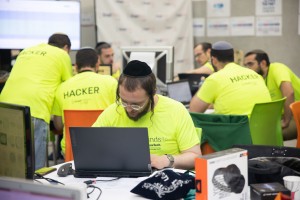
Orlee Guttman, co-fondatrice du LevTech Entrepreneurship Center au JCT qui a organisé le hackathon, se réjouit des résultats. « Tous les étudiants qui ont participé au hackathon ont été formidables et ont fait preuve d’un effort et d’une créativité formidables. Ils ont appris de nouvelles technologies en quelques heures et ont ensuite créé de nouveaux produits en les utilisant. Comme nous l’avons vu au cours des dernières années, leur innovation et leur dynamisme se poursuivent également après le hackathon, alors qu’ils s’efforcent de mettre ces produits sur le marché, d’améliorer l’expérience des consommateurs et l’efficacité de l’entreprise, et aident souvent à sauver des vies en même temps ».
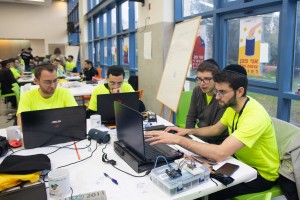
ShopperTrack : l’équipe constituée de quatre participants du JCT, tous français, a remporté le deuxième prix du hackathon. Raphael Haehnel, Hillel Saal, Yehochoua Lalou et Chmouel HaïIllouz ont développé un logiciel basé sur les concepts d’apprentissage automatique et de traitement d’images qui vise à améliorer l’expérience des consommateurs dans les magasins en analysant leur activité lorsqu’ils se déplacent, en utilisant les caméras du magasin. Ce logiciel établit une carte informant les commerçants de l’endroit où se trouvent les consommateurs, où ils ont tendance à se rassembler, quel est leur itinéraire préféré et quels produits les intéressent.
Ces données, le logiciel peut facilement déterminer quels produits sont au mauvais endroit, où placer de nouveaux produits ou de la publicité, ou même essayer de nouvelles configurations de rayon et analyser la réaction des clients. Ce logiciel est applicable à plusieurs secteurs, notamment la vente au détail, les hôpitaux, le tourisme, les chantiers de construction…
« De plus en plus de personnes achètent en ligne de nos jours, nous voulions donc travailler sur quelque chose pour aider les propriétaires de magasins à gagner leur vie et garder les consommateurs dans les magasins physiques », a déclaré Saal, un étudiant en génie logiciel. « Nous voulions également acquérir de nouvelles compétences grâce à ce défi. Ce projet implique l’apprentissage automatique et la vision par ordinateur, ce que nous n’avions jamais fait, ça a été vraiment génial. C’est aussi une opportunité pour nous de construire quelque chose avec une entreprise qui pourrait éventuellement être en mesure de vendre le produit ».
En troisième place, Yosef « JJ » Maryles, originaire de New York, et son équipe – Malachi Mahpod, Achiya Danziger, Nerya Naiman, Noam Shveber – ont conçu un programme d’évaluation des risques de certains endroits pour les policiers. Le programme « C.O.P. » permet à la police israélienne d’optimiser l’emplacement des unités de police dans une ville donnée en fonction du nombre de crimes par jour, de l’heure et de la gravité des cas dans cet endroit.
Le Hackathon est organisé par le LevTech Entrepreneurship Center du JCT, qui comprend également un programme de pré-accélération pour aider les étudiants à transformer leurs idées en produits et en start-up. Les gagnants ont été sélectionnés par un panel de neuf juges issus d’entreprises israéliennes et internationales à succès.
[:en]
A team of three Jerusalem College of Technology (JCT) students, two of which are from France and Brazil, took home first place last week at the 6th annual Jerusalem College of Technology (JCT) Great Minds Hackathon when they developed an advanced software to better locate equipment.
Many organizations and companies have important machinery that moves regularly from different locations without documentation. In such cases, the ability to locate the equipment on a regular basis is often required, but since many are in a closed structure, standard GPS cannot be used as it is not accurate enough within buildings.
Wi-Find, the winning team of Yosef Mizrahi (Brazil), Ariel Szmerla (France) and Amitai Salomon (Israel), developed an easy-to-use solution using inexpensive components that can pick up data from the signals around it. They developed a way to process the information and map out the exact location of the object. There are endless uses for this technology, especially in places with lifesaving and/or expensive mobile equipment, such as hospitals, construction sites and more.
Based on the technology, one can also build a model ahead of time to best position mobile equipment in order to minimize the time employees waste searching for a necessary machine. In a hospital, for example, with this technology, one would know exactly where mobile lifesaving equipment is at any given moment, and a model could additionally be built on where to best position the equipment in the first place. In addition to the medical realm, other industries could maximize employees’ time through efficient management and locating equipment, such as industrial equipment and supermarket carts, more accurately locating people by using their smartphones, and more.
Orlee Guttman, co-founder of the LevTech Entrepreneurship Center at JCT that organized the hackathon, was thrilled with the results. “All of the students that participated in the hackathon were amazing and showed tremendous effort and creativity. They learned new technologies in a matter of hours and then created new products using them. As we’ve seen in past years, their innovation and drive continues after the hackathon as well, as they work to bring these products to market, improve consumer experience and business efficiency, and often help save lives at the same time.”
Over 100 Orthodox and Ultra-Orthodox Jerusalem College of Technology Israeli and international students took part in the hackathon, working on challenges presented by the likes of Intel, Rafael Advanced Defense Systems, Medtronic, SpotReality, Toldot Yisrael, and the Israeli Police.
ShopperTrack, a team of JCT students all of whom are new immigrants from France, took home the second place prize at the hackathon when they developed software based on the concepts of machine learning and image processing, which aims to improve consumer experience in stores by analyzing the activity of consumers as they move through the store, using the stores own cameras. Raphael Haehnel, Hillel Saal, Yehochoua Lalou and Chmouel HaïIllouz created software that detects people in stores and establishes a map informing retailers of where consumers are, where they tend to congregate, what their preferred route is and what products they are interested in. From all this data, the software can easily determine which products are in the wrong place, where to place new products or advertising, or even try new shelf configurations and analyze customer reaction. This software is applicable to multiple industries, including retail, hospitals, tourism, construction sites, and more.
“There is a trend of more and more people shopping online nowadays, so we wanted to work on something to help store owners with their livelihoods and keep consumers inside physical stores,” said Saal, a software engineering student. “We also wanted to learn new skills through this challenge. This project involves machine learning and computer vision, which are things we never did before, so it’s been really great. It is also an opportunity for us to build something with a company that might eventually be able to sell the product.”
In third place was Yosef « JJ » Maryles, originally from New York, and his team – Malachi Mahpod, Achiya Danziger, Nerya Naiman, Noam Shveber – who devised a program providing risk assessment of certain locations to police officers. The program, « C.O.P., » allows Israel Police to optimize the location of police units within a particular city according to the amount of crime per day, time and severity of cases in that location.
The hackathon is run by the LevTech Entrepreneurship Center of JCT, which also includes a pre-accelerator program to help students turn their ideas into products and start-ups. The winners were selected by a panel of nine judges from successful Israeli and international companies.
“Usually it takes about a week for participants to create working demos at a hackathon. To see the level of demos these students built in just 48 hours, and the creativity and innovation that went along with it, was really quite unique,” said Dr. Tomer Simon, chief scientist at Microsoft Israel R&D Center and a judge at the hackathon. “The energy of the students was amazing, and it was very nice to see the challenge-oriented format that connected the students to companies which helps prepare them for real challenges in the business world. Overall, the level of implementation and self learning was tremendous and the hunger for the students to push themselves was evident.”
The Jerusalem College of Technology (JCT) – Lev Academic Center has a history of excellence in engineering, electro-optics and defense-related R&D. Approximately half of JCT’s students study engineering, including computer science, electro-optics, electronics, and industrial engineering. Other areas of specialty at JCT include business, accounting, and health sciences. Students at JCT come from Israel and 23 countries around the world. JCT graduates have established numerous hi-tech companies, and are top engineers at the country’s aerospace and defense industries.
[:]

